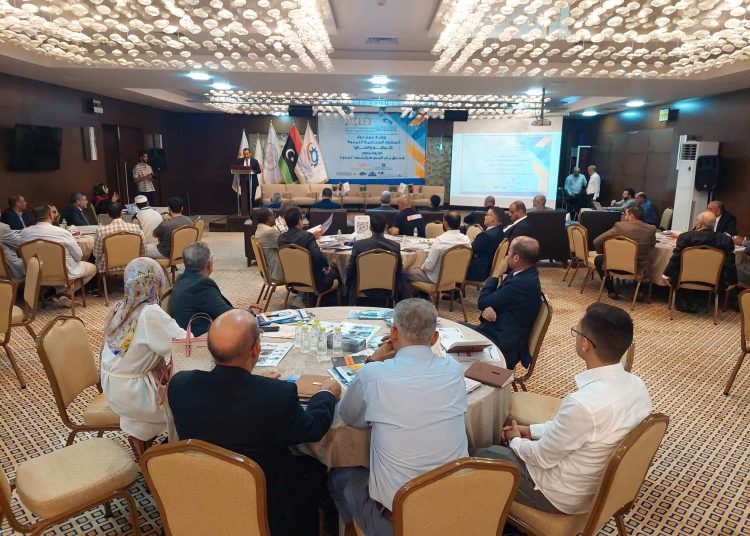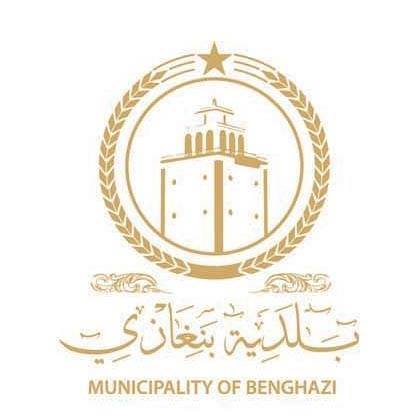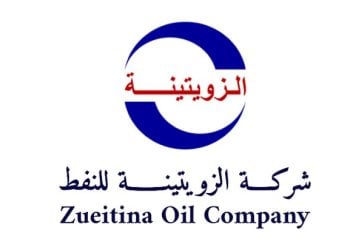The Libyan private manufacturing sector proved itself during the Corona crisis with its ability to provide the country with a strategic food reserve, which the government did not have, the Tripoli based Economy and Trade Minister, Mohamed Hwej, said.
Hwej was speaking at yesterday’s Tripoli workshop on ‘‘Libyan Industrial Exports – Reality and Prospects’’ organised by the Libya Industry Union (LIU) and the Libyan Experts Forum (LEF).
Hwej praised Libyan business for being entrepreneurial and said Libya’s instability since 2011 has affected the manufacturing sector. He said Libya’s economy needs diversification which includes manufacturing and services.
He asked how and why the manufacturing sector can be improved? Why is it not protected through tariffs? Hwej pointed out that Tunisia imposes a 20 percent customs tariff on Libyan imports whilst Libya does not. He said Libya should reciprocate. He also pointed to EU import quotas. He said the sector needs to be protected against dumping of substandard goods.
He also said the workshop needed to look at the legislative environment and see where the sector is being obstructed.
The Economy and Trade Minister said priorities need to be set in supporting the sector. The olive oil sector, for example, could be one obvious priority, he said.
Libya’s banking sector is not working
Hwej said Libya’s banking sector is a problem – it is not working. The private sector cannot develop without financing through, amongst other ways, banks.
The sector needs a vision
The Economy Minister said the Libyan manufacturing sector needs a vision. He said Libya was behind its neighbours and peers in manufacturing. Above all, this vision needs implementation, he added. He invited the workshop to come up with implementable policy plans.
In conclusion, he said the Libyan private sector is relatively young and needs support and that his government was in full support.
Developing manufacturing exports: a priority of diversification
Mohamed Abusnina, the head of LEF, said in his speech that developing manufacturing exports is a priority of the diversification of the Libyan economy and the country’s sources of revenues.
Abusnina is a respected economist, academic and former member of the Central Bank of Libya. The LEF is a house of expertise NGO established by the UNDP. It initiated the workshop and organised the 11 scientific papers presented by academics and experts on Libya’s manufacturing sector.
Indeed, Abusnina said the progress of a state can be assessed by the development of its industry and the percentage of employees in the manufacturing sector. He said the workshop must display not only the obstacles but also the successes of the Libyan manufacturing sector.
Iron and steel acts as base for other manufacturers
The chairman of the Libyan Iron and Steel Company (LISCO), Mohamed Al-Faqih, said in his presentation that the country’s iron and steel industry acts as a base for many other complimentary Libyan industries. He revealed that even his huge state industry employing over 6,000 Libyans faces regular bureaucratic obstacles to its exports.
He said LISCO has overproduction in some products and needs to export this to gain hard currency to pay for other imported needs. Manufacturing needs government support especially in export finance, he reiterated. He complained that bank managers are too conservative and too risk averse when it comes to offering loans or export guarantee services.
Whilst most Libyan manufacturing concerns were historically started with individual savings, today, he said, even one billion Libyan dinars (around US$ 142 million) is not enough as private capital to start an industry. The sector needs finance, he stressed. He also pointed out that the sector employs tens of thousands directly and indirectly.
General obstacles to the Libyan manufacturing sector
There were 10 papers presented at the workshop each focusing on a specific manufacturing export issue. The contents of which can be summarised as follows:
The subject of obstacles to the sector were dealt with by one speaker. These included the obvious lack of stability in the country in general but also the lack of stability of the exchange rate of the Libyan dinar. This constantly moving target made it difficult to plan and operate for manufacturers.
Libya’s poor infrastructure such as transport, shipping, logistics, electricity, and communications all negatively affect the sector, it was proposed.
The private sector was also accused of a lack of desire to invest in the manufacturing sector. It was thought that it prefers the easier trade sector instead.
Historical laws and regulations also need to be changed to support the sector more in line with neighbouring states and modern times.
It was revealed that on paper, Libya has about 40 state-owned industrial zones, but that these are not all built and those that are, are not prepared to meet current demands.
The sector also over relies on unskilled foreign manpower. It was proposed that the government should put in place adequate incentives for the private sector to train the workforce.
The experts also felt that there was no connectivity between manufacturing, exports and raw material supplies and that local cost of production is relatively high compared to Libya’s peers.
The sector also suffers from an overdependence on imported raw materials which requires foreign exchange and letters of credit for imports.
It was also proposed that some Libyan products do not adhere to specifications.
With regards to transport, it was thought that some Libyan ports are not up to standard. With regards to exports by road to sub-Saharan Africa, it was stated that they faced high transport costs due to poor road connectivity and poor security enroute.
Reiterating the poor banking sector, it was stated that Libyan banks should offer branches or correspondence banks to help Libyan manufacturers repatriate their export sales revenues. Banks, with the backing of the state, should also offer export guarantee services to reduce the risk of exports for Libyan industry. The establishment of an export bank for financing exports was also proposed.
The government should also improve the service offered by its Commercial Attaches abroad. They should be a useful contact point armed with information and data on the local markets to aid potential exporters open markets.
With regards to data, it was agreed that there was a general shortage of information, data and studies on export markets for Libyan manufacturers to help guide their export efforts.
Libyan industry needs reciprocal protection
Expanding on the need for reciprocal protection of Libyan industry, one paper said reciprocal protection makes Libyan industry competitive against imports, and especially the lower grade imports that can be part of dumping. There was a call for an anti-dumping law. Reciprocal, like-for-like protection was distinguished from protectionist barriers.
It was pointed out, for example, that Turkey imposes tariffs on Libyan products whilst Turkish products enter Libya tariff free.
Reciprocal protection of Libyan industry creates and saves local jobs, saves foreign exchange and encourages foreign direct investment.
Moreover, it was proposed that customs tariffs are raised on targeted products to protect nascent and successful Libyan industry. Tariffs are to be temporary and maybe tapered over a determined time.
Imposing of standards
Libyan manufacturers should also raise the standard and specifications of their products to compete at higher ends of the export market and earn more revenue. Standards should also be raised on imports to avoid the dumping of substandard products.
Import licencing?
In conjunction with tariffs, it was advised that there could be a return to licencing for imports – or at least some imports. This enables the government to be in control of what enters the market and have data. During the discussion section of the workshop, there was some opposition to going back to import licencing.
Vision and policy
Speakers also echoed the Economy Minister’s proposal that there needs to be an overall vision and policies for the sector. This offers direction, guidance and control over and for the sector. This needs to be in a digital form in the way of a joint Economy and Industry Ministry e-platform freely accessible to current and potential manufacturers and exporter.
Priority to local products in government purchases
One quick and easy way the government could help local industry is the prescription that government purchases should prioritise local products ahead of imported goods. This helps local production sales, creates and saves jobs, sends a positive message on local products, performs some marketing and saves on foreign currency used to pay for imports.
Promoting Libya as a manufacturer
It was also proposed that the government should do more to promote Libya as a manufacturer. It was reported that many potential customers overseas were suspicious that Libyan products were simply repackaged imports. Libya is still seen simply as an exporter of hydrocarbons.
The government and its embassy commercial sections should do more to promote Libyan manufacturing to help open markets.
The workshop’s organising committee is working on the final recommendations, a draft of which was read out at the end of the event.










